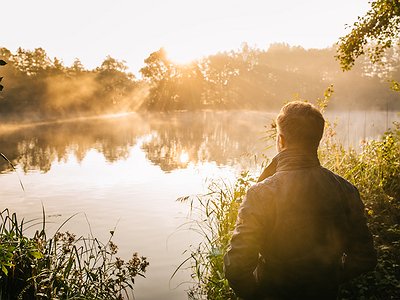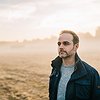Part 2
Could you take us through a day in your life, from a possible morning routine through to your work? Do you have a fixed schedule? How do music and other aspects of your life feed back into each other - do you separate them or instead try to make them blend seamlessly?
I have a quite clearly structured day. I usually set my goals for the day in the morning while having breakfast. This helps me to stay focused and get things done. If you limit your time for certain things, it's amazing how much more you can get done as you're quite focused on your goals. I also try to use the "dead time" in the car, for example, to listen to podcasts in order to learn new things. So everything blends seamlessly.
Could you describe your creative process on the basis of a piece or album that's particularly dear to you, please? Where did the ideas come from, how were they transformed in your mind, what did you start with and how do you refine these beginnings into the finished work of art?
Well, an interesting process for me was my last Album AMBITRONIC.
I wrote and produced this album in almost one month. I started early in the morning with the clear goal to get one song a day done. I knew that was almost impossible but it forced me to stay very focused. Now under pressure, you can’t be very creative, but it was at least my goal. I knew from experience that I will struggle having good ideas. But ultimately, if you start working on ideas, they will come. And so I started improvising every day in the morning and collected ideas. When I liked something, I developed it further. The next day I did not continue with that song but instead developed new ideas. Only if I really had no idea anymore, I continued polishing and finishing the previous songs while keeping an eye on a unique sound for the album.
There are many descriptions of the ideal state of mind for being creative. What is it like for you? What supports this ideal state of mind and what are distractions? Are there strategies to enter into this state more easily?
One important thing is to avoid distractions and stay focused. But it is also important to have breaks in between and to do something completely different. At least this approach helps me. To me, inspiration will often come as soon as I start working on it. If I just sit there and wait until I have an inspiration, nothing would happen. Instead, I either work on it, get inspired by other artists or music or simply go out and do something different which gives me fresh energy to continue.
How is playing live and writing music in the studio connected? What do you achieve and draw from each experience personally? How do you see the relationship between improvisation and composition in this regard?
When playing your music live, you’ll get a direct response on what works and what not. This experience is something you can use when working on the next tracks. When you only work in the studio, you sometimes miss this direct response. Regarding the relationship between improvisation and composition, this is to me closely connected. I almost always start with improvising on the piano or keyboard and develop my songs from there.
How do you see the relationship between the 'sound' aspects of music and the 'composition' aspects? How do you work with sound and timbre to meet certain production ideas and in which way can certain sounds already take on compositional qualities?
The sounds I use are extremely important for me and they play a big role already during the composition. Sounds inspire me a lot. Especially in the electronic music genre, a certain sound can be an essential part of the composition. Regarding sound design during production, I spend a lot of time to get a unique sound for the song and ultimately for the whole album. As the inspirational aspect of sounds helps me to develop new ideas, they often have compositional qualities. For example the vocal sample parts I used in some of the tracks on AMBITRONIC.
Our sense of hearing shares intriguing connections to other senses. From your experience, what are some of the most inspiring overlaps between different senses - and what do they tell us about the way our senses work? What happens to sound at its outermost borders?
Wow, that's a difficult question. Well to me, the sound has always some connection to colors. When I hear certain sounds, I can tell you which colors I associate with it. I have no idea why this is and where that comes from, but at least I have this association.
I also believe that the cover artwork has an influence in how we listen to the music. At least there is an expectation in how the album will sound.
Another interesting story to share is that I recently received for the second time from two different persons that they had a difficult time in the hospital. They told me, that my music helped them to go through these difficult times. So the fact that they took the time to write me that and that the music obviously did something with them shows that there must be a connection to other senses.
Art can be a purpose in its own right, but it can also directly feed back into everyday life, take on a social and political role and lead to more engagement. Can you describe your approach to art and being an artist?
Well, my music carries no political statement as such. The only statement I would have is that this world definitely needs more love. I'm trying to transport this message through my music. The lyrics of some of my tracks underline that.
It is remarkable, in a way, that we have arrived in the 21st century with the basic concept of music still intact. Do you have a vision of music, an idea of what music could be beyond its current form?
I believe that music in its current form will forever exist. But maybe things change with artificial intelligence in the future, so that music will be created by machine based algorithms. Maybe virtual reality plays a bigger role and we’ll have concerts in virtual stadiums with virtual artists one day. No idea.
But I believe the heart and soul a musician puts into his music can never be replaced by a machine.






